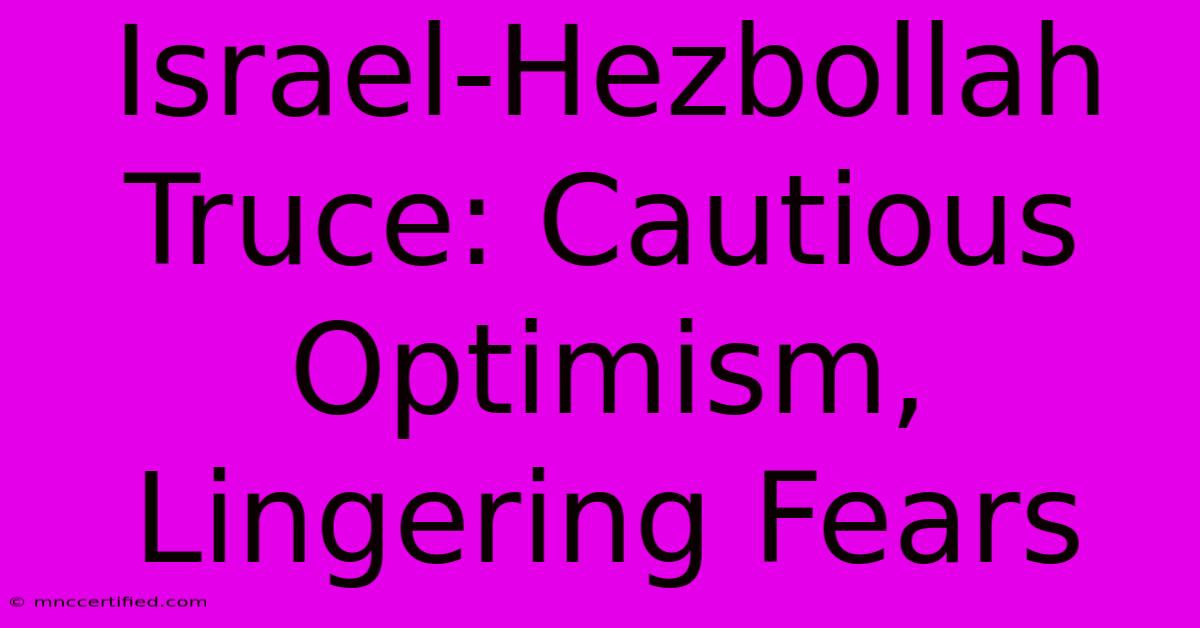Israel-Hezbollah Truce: Cautious Optimism, Lingering Fears

Table of Contents
Israel-Hezbollah Truce: Cautious Optimism, Lingering Fears
The recent unofficial truce between Israel and Hezbollah has brought a tentative calm to the volatile border region, sparking cautious optimism while simultaneously fueling lingering fears. This fragile peace, brokered through indirect channels, follows years of escalating tensions and sporadic clashes. While the immediate cessation of hostilities is a welcome development, several factors cast doubt on the long-term viability of this uneasy agreement.
Understanding the Current Situation
The current truce, while not officially acknowledged by either side, represents a significant de-escalation. It follows a period of heightened activity, including cross-border exchanges of fire and increased military deployments. Key to understanding this development is the recognition of both sides' limitations and priorities. Israel, facing multiple security challenges, likely sought to avoid a wider conflict at this time. Hezbollah, weakened by internal and external pressures, may have calculated that an escalation wouldn't serve its strategic interests.
The Role of External Actors
The involvement of external actors, particularly regional powers and international mediators, should not be underestimated. These actors played a significant role in facilitating communication and managing expectations, ensuring that the fragile truce didn't collapse under the weight of mistrust. Their continued involvement will be crucial in maintaining stability and preventing future escalations. The success of this indirect mediation highlights the importance of skillful diplomacy in navigating complex geopolitical landscapes.
Cautious Optimism: Reasons for Hope
Despite the underlying uncertainties, several factors contribute to cautious optimism:
- Reduced immediate threat of conflict: The most obvious positive is the immediate cessation of violence, allowing for a much-needed period of relative calm. This allows both sides to focus on internal challenges rather than the immediate threat of war.
- Potential for economic development: A sustained period of peace could unlock economic opportunities in the region, particularly in Southern Lebanon, which has long suffered from instability. Increased trade and investment could contribute to long-term stability and prosperity.
- Opportunity for dialogue: The truce provides a window of opportunity for indirect negotiations and confidence-building measures, paving the way for a more formal agreement in the future. This could involve addressing underlying grievances and seeking solutions to long-standing disputes.
Lingering Fears: Challenges to Lasting Peace
However, the optimism is tempered by several significant challenges:
- Underlying tensions remain: The truce doesn't address the root causes of the conflict, including Hezbollah's military capabilities, Israel's security concerns, and the ongoing conflict in Syria. These underlying tensions could easily reignite violence if left unaddressed.
- Fragility of the agreement: The unofficial nature of the truce makes it inherently fragile. A single incident, miscalculation, or escalation elsewhere could easily unravel the agreement, plunging the region back into conflict.
- Internal pressures: Both Israel and Hezbollah face internal political pressures that could undermine the truce. Changes in government or shifts in political priorities could lead to a renewed commitment to military action.
- The role of non-state actors: The involvement of various non-state actors, including other militant groups operating in the region, introduces an additional layer of complexity and uncertainty. Their actions could easily destabilize the fragile peace.
The Path Forward: Towards Sustainable Peace
The Israel-Hezbollah truce represents a critical juncture. While the immediate benefits are clear, lasting peace requires a multi-faceted approach:
- Addressing root causes: Open dialogue and confidence-building measures are crucial to addressing the underlying grievances that fuel the conflict.
- Strengthening regional stability: Regional powers must play a constructive role in supporting the truce and promoting stability in the broader context of the Middle East.
- International involvement: Continued international engagement, including through diplomacy and humanitarian aid, can contribute to sustaining the truce and promoting long-term peace.
- Focus on socio-economic development: Investments in economic development, particularly in Southern Lebanon, can contribute to reducing grievances and building a more prosperous future.
The Israel-Hezbollah truce offers a glimmer of hope, but sustaining this fragile peace requires a concerted effort from all stakeholders. The path towards sustainable peace is long and arduous, but with careful diplomacy, commitment to dialogue, and a focus on addressing the root causes of conflict, it remains achievable. The coming months will be crucial in determining whether this truce will blossom into a more lasting peace or simply be a temporary reprieve from further violence.

Thank you for visiting our website wich cover about Israel-Hezbollah Truce: Cautious Optimism, Lingering Fears. We hope the information provided has been useful to you. Feel free to contact us if you have any questions or need further assistance. See you next time and dont miss to bookmark.
Featured Posts
-
Trump Picks Bhattacharya For Covid Lead
Nov 28, 2024
-
Trading In A Salvage Title Car
Nov 28, 2024
-
Vikings Acquire Daniel Jones
Nov 28, 2024
-
Euro Millions Blunder Check Your Ticket
Nov 28, 2024
-
Volcano Bees Belgian On Celtic
Nov 28, 2024